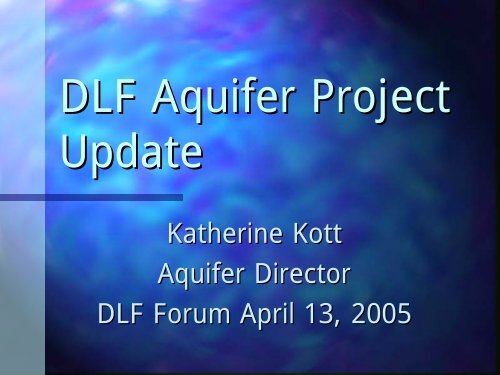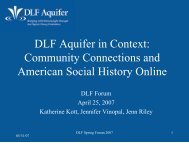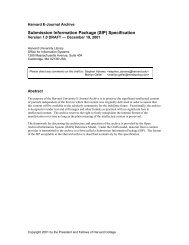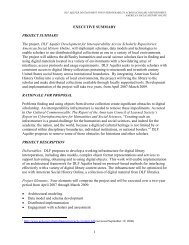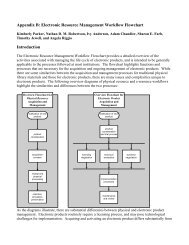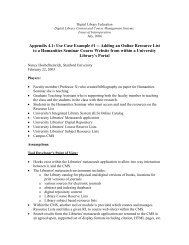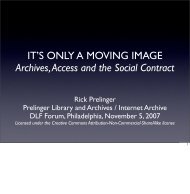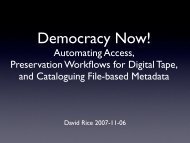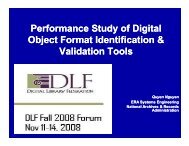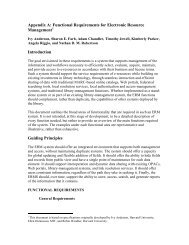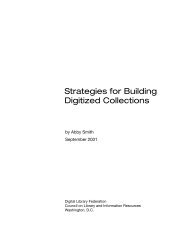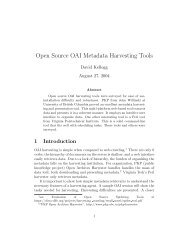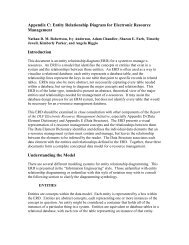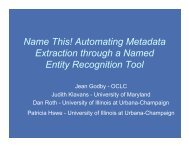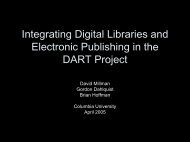DLF Aquifer Project Update - Digital Library Federation
DLF Aquifer Project Update - Digital Library Federation
DLF Aquifer Project Update - Digital Library Federation
Create successful ePaper yourself
Turn your PDF publications into a flip-book with our unique Google optimized e-Paper software.
<strong>DLF</strong> <strong>Aquifer</strong> <strong>Project</strong><br />
<strong>Update</strong><br />
Katherine Kott<br />
<strong>Aquifer</strong> Director<br />
<strong>DLF</strong> Forum April 13, 2005
What is <strong>DLF</strong> <strong>Aquifer</strong><br />
• Collaborative effort amongst <strong>DLF</strong><br />
members<br />
• Test-bed of library tools & services for<br />
the scholar<br />
• Quality content, initially focused on<br />
American culture and life<br />
• The distributed online digital library of<br />
the <strong>Digital</strong> <strong>Library</strong> <strong>Federation</strong>
Who is <strong>DLF</strong> <strong>Aquifer</strong><br />
• California <strong>Digital</strong> <strong>Library</strong><br />
• Emory University<br />
• Indiana University<br />
• Johns Hopkins<br />
University<br />
• <strong>Library</strong> of Congress<br />
• New York University<br />
• Stanford University<br />
• University of Illinois,<br />
Urbana-Champaign<br />
• University of Michigan<br />
• University of Minnesota<br />
• University of Tennessee<br />
• University of Virginia
<strong>DLF</strong> <strong>Aquifer</strong> background<br />
• Envisioned as a key initiative when<br />
<strong>Digital</strong> <strong>Library</strong> <strong>Federation</strong> was chartered<br />
in 1995<br />
• The idea has informed other <strong>DLF</strong><br />
initiatives<br />
• Its strategic importance was<br />
emphasized in 2003 <strong>DLF</strong> planning<br />
process
Support for <strong>DLF</strong> <strong>Aquifer</strong><br />
• <strong>Digital</strong> <strong>Library</strong> <strong>Federation</strong> capital funds<br />
provide support<br />
• Many initiatives that are seeding <strong>DLF</strong><br />
<strong>Aquifer</strong> have other funding support<br />
• Outside funding is being sought
The <strong>DLF</strong> <strong>Aquifer</strong> Name<br />
• Unnamed in the 1995 charter but<br />
referred to as “the distributed online<br />
digital library of the <strong>DLF</strong>”<br />
• Called DODL<br />
• Re-named <strong>Aquifer</strong> in the 2003 strategic<br />
process<br />
• Tagged <strong>DLF</strong> <strong>Aquifer</strong> in 2005<br />
• Current work on <strong>DLF</strong> <strong>Aquifer</strong> “identity”
Why <strong>DLF</strong> <strong>Aquifer</strong><br />
• Enabling libraries to deliver quality<br />
digital content through services to<br />
scholars<br />
• Leveraging development through<br />
collaboration<br />
• Complementing and building on other<br />
efforts, including mass digitization<br />
• Improve signal to noise ratio
<strong>DLF</strong> <strong>Aquifer</strong> Problem Space<br />
• <strong>DLF</strong> <strong>Aquifer</strong> will provide tools and services for<br />
pooling and piping content<br />
• <strong>DLF</strong> <strong>Aquifer</strong> will inter-operate with:<br />
• Repositories that preserve<br />
• Content management systems that provide structure<br />
• E-learning systems that support the teaching and<br />
learning process<br />
• Personal content management systems that support the<br />
scholar<br />
• <strong>DLF</strong> <strong>Aquifer</strong> will siphon content from mass<br />
digitization projects
When is <strong>DLF</strong> <strong>Aquifer</strong><br />
• Building on existing <strong>DLF</strong> initiatives and<br />
beyond<br />
• Three one-year development phases<br />
• Prototype available within first phase
Building Blocks<br />
• Collection logs<br />
• IMLS collection registry<br />
• <strong>DLF</strong> collections database<br />
• Best practices development (e.g. OAI)<br />
• User studies<br />
• Framework and toolkit development
Development phases<br />
• Leveraging existing collections, tools<br />
and services<br />
• Enhancing and developing tools,<br />
services and collections<br />
• Implementing “deep sharing”
Phase I: Leveraging<br />
• Identify existing collections<br />
• Harvest metadata or federate in other<br />
currently available ways<br />
• Apply existing tools and services for<br />
access and retrieval
Phase II: Enhancing<br />
• Adding collections to fill gaps<br />
• Developing tools for metadata<br />
enhancement<br />
• Developing new tools for the scholar
Phase III: Deep sharing<br />
• Enable delivery of digital objects as well<br />
as object metadata<br />
• Interoperate with repositories for object<br />
capture and deposit
Where is <strong>DLF</strong> <strong>Aquifer</strong><br />
• Distributed development<br />
• Component projects at participant libraries<br />
(e.g. collections registry hosting at UIUC)<br />
• Widely available<br />
• <strong>DLF</strong> support from D.C. office<br />
• <strong>Aquifer</strong> Director at Stanford<br />
• Website at http://www.diglib.org<br />
www.diglib.org/aquifer/
How will <strong>DLF</strong> <strong>Aquifer</strong> happen<br />
• <strong>Federation</strong>—the the vision of the group<br />
• Development of processes<br />
• To tie existing work together<br />
• To identify gaps<br />
• To foster development in gap areas
Nuts and bolts of collaboration<br />
• Belief that libraries can add better value<br />
to the scholarly process through<br />
cooperation<br />
• Altruism--<br />
--decreasing one’s s own fitness<br />
to increase the fitness of another<br />
(something bigger)
The <strong>DLF</strong> <strong>Aquifer</strong> “organization”<br />
• <strong>Aquifer</strong> Prototype Group was “committee of<br />
the whole”<br />
• <strong>Aquifer</strong> director position filled<br />
• Re-designed organizational structure in<br />
implementation<br />
• <strong>Aquifer</strong> Prototype Group “sunset” at February<br />
meeting<br />
• Replaced by smaller <strong>Aquifer</strong> Implementation<br />
Group
<strong>DLF</strong> <strong>Aquifer</strong> participation<br />
• Core <strong>DLF</strong> <strong>Aquifer</strong> participants<br />
• Contribute collections<br />
• Contribute staff effort<br />
• Host systems or services<br />
• Think about their organizations differently as a<br />
result<br />
• Many others are involved<br />
• <strong>DLF</strong> member libraries contribute collections<br />
• Other partners work on initiatives upon which<br />
<strong>Aquifer</strong> is built
Current <strong>DLF</strong> <strong>Aquifer</strong> activities<br />
• Four working groups formed<br />
• Collections<br />
• Metadata<br />
• Technology<br />
• Services<br />
• Working groups recommend policy to<br />
<strong>Aquifer</strong> Implementation Group
Vision for the future<br />
• Working groups will design discrete<br />
projects hosted by participant libraries<br />
• Staff will grow in a distributed way<br />
• Initiative will iterate<br />
• <strong>DLF</strong> <strong>Aquifer</strong> will build on other work<br />
• <strong>DLF</strong> <strong>Aquifer</strong> will spawn new work<br />
• Models for ongoing deployment will be<br />
developed
Who will benefit<br />
• <strong>DLF</strong> <strong>Aquifer</strong> envisioned as:<br />
• <strong>Library</strong> services for the scholar<br />
• Freely available for integration in the<br />
individual library environment<br />
• Of benefit to libraries<br />
• Of benefit to scholars
Questions<br />
Katherine Kott<br />
kkott@clir.org


